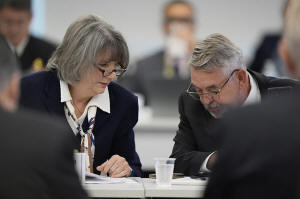Kennedy's advisory panel recommends new restrictions on MMRV vaccines
[September 19, 2025]
By MIKE STOBBE and LAURA UNGAR
ATLANTA (AP) — U.S. Health Secretary Robert F. Kennedy Jr.’s hand-picked
vaccine advisory committee on Thursday recommended the Centers for
Disease Control and Prevention adopt new restrictions on a combination
shot that protects against chickenpox as well as measles, mumps and
rubella.
The panel advised that the vaccine known as MMRV not be given before age
4 and that children in this age group instead get separate vaccines —
one against MMR and another for varicella, or chickenpox. The vote was
8-3, with one member abstaining.
The Advisory Committee on Immunization Practices put off an expected
vote on hepatitis B shots given to infants on the day they are born. On
Friday, it’s expected to decide whether to recommend that some babies
can wait a month for those shots, and to also take up COVID-19 shots.
The committee makes recommendations to the CDC director on how
already-approved vaccines should be used. CDC directors have almost
always accepted those recommendations, which are widely heeded by
doctors and guide vaccination programs. Committee Chairman Martin
Kulldorff said committee members aim to reassure the public and remove
unnecessary risks and harms.
But many doctors and public health experts say the committee is creating
fear and mistrust around vaccines at a time when U.S. vaccination rates
are already falling. Kennedy, a leading antivaccine activist before
becoming the nation’s top health official, has made or proposed numerous
changes to the nation’s vaccine system, including firing the entire
17-member panel earlier this year and replacing it with a group that
includes several anti-vaccine voices.

Thursday's meeting “promoted false claims and misguided information
about vaccines as part of an unprecedented effort to limit access to
routine childhood immunizations and sow fear and mistrust in vaccines,”
Dr. Susan Kressly, president of the American Academy of Pediatrics, said
in a statement. “Instead of emerging with clear guidance about vaccines
that we know protect against serious illnesses, families are left with
confusion, chaos and false information.”
Experts are also concerned the panel's actions could narrow access to
the vaccines. The group voted 8-1, with three abstentions, to keep MMRV
covered for kids as young as 12 months under the Vaccines for Children
program, which pays for about half the shots given to kids in the U.S.
Several committee members expressed confusion during that follow-up vote
on whether to align payments under the program with the more restrictive
vaccine guidance they had just passed. Another federal official noted
that there are other government insurance programs, including Medicaid,
that will need to stop paying for that early combo dose because they
have to follow CDC recommendations.
Panelists focus on rare seizures
Discussions on the MMRV vaccine focused largely on rare instances of
feverish seizures associated with the first dose, given to kids between
ages 1 and 2.
Committee member Dr. Cody Meissner said such seizures may be “a very
frightening experience” for families, but medical experts agree they're
not linked to brain function or school problems.
The panel last dealt with the issue in 2009, when it said either the
combination shot or separate MMR and chickenpox shots were acceptable
for the first dose, but that separate doses were generally preferred.
Today, 85% of kids receive separate doses for the first round, according
to information presented at the meeting.

Some doctors and public health experts say they are not aware of any new
safety data that would explain the revisiting of those vaccination
recommendations — and, in fact, many of the studies discussed Thursday
were more than a decade old.
Dr. Richard Haupt, a vice president at Merck, which makes the MMRV
vaccine ProQuad, said it’s been evaluated through clinical trials and
post-approval studies, and the slight increase in feverish seizures
after the first dose led to current CDC recommendations. Combination
vaccines improve completion and on-time vaccination at a time when the
nation is seeing a troubling decline in vaccination coverage, he said.
[to top of second column]
|

Committee members, Dr. Joseph Hibbeln, right, talks with Vicky
Pebsworth, left, during a meeting of the Advisory Committee on
Immunization Practices at the CDC on Thursday, Sept. 18, 2025, in
Chamblee, Ga. (AP Photo/Brynn Anderson)
 Mike Osterholm, a University of
Minnesota expert on infectious diseases, said he doesn't see the
need for a new recommendation.
“It’s solution looking for a problem,” he said in an interview. “We
have managed the MMRV vaccine situation for a number of years
without any issues in terms of safety. It is a situation where it
also allows a parent to have that discussion with their healthcare
provider."
The vaccine panel also discussed the hepatitis B shot
As many as 2.4 million people in U.S. are estimated to have
hepatitis B, which can cause serious liver infections, and half are
unaware of infection, a CDC presenter told the panel.
In adults, the virus is spread through sex or through sharing
needles during injection-drug use. But it can also be passed to a
baby from an infected mother, and as many as 90% of infected infants
go on to have chronic infections. The virus can also live on
surfaces for more then seven days at room temperature, and
unvaccinated children living with anyone with a chronic infection
are at risk.
A hepatitis B vaccine was first licensed in the U.S. in 1981. In
2005, the ACIP recommended a dose within 24 hours of birth for all
medically stable infants who weigh at least 4.4 pounds (2
kilograms). The infant shots are 85% to 95% effective in preventing
chronic hepatitis B infections, studies have shown.
Following the 2005 recommendation, hepatitis B cases among infants
fell from 5,494 cases per year in 2005 to 2,214 cases in 2023.
During Thursday’s discussion, some committee members questioned
whether babies born to moms who test positive for hepatitis B are
the only ones who truly need a vaccine in the first day of life.
By giving virtually all babies the hepatitis B right after birth,
“Are we asking our babies to solve an adult problem?” asked
committee member Dr. Evelyn Griffin.

But Meissner expressed bewilderment at some of this discussion.
“This an absolutely safe vaccine,” he said. “I’m not sure what we’re
gaining by avoiding that first dose within 12 to 24 hours after
birth.”
Several outside medical experts asked why the committee was debating
the issue at all.
“The signal that is prompting this is not one of safety," committee
member Dr. Robert Malone responded. "It’s one of trust. And it’s one
of parents uncomfortable with this medical procedure being performed
at birth in a rather unilateral fashion without significant informed
consent.”
Osterholm said there will be consequences.
“As more doubt is sown in the safety of vaccines by this committee
and political leaders in our health department, we’re going to see
fewer people getting vaccinated and the return of the diseases we
largely conquered," he said. "It will make us less safe and less
healthy as a nation.”
___
Ungar reported from Louisville, Kentucky. AP Medical Writer Lauran
Neergaard contributed to this story.
All contents © copyright 2025 Associated Press. All rights reserved
 |